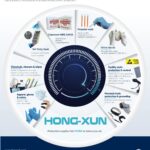In biotechnology and molecular biology, labswabs serve essential roles in sample collection, preparation, and testing. Here’s a detailed look at their applications, best practices, and benefits for clients.
Applications of Labswabs in Biotechnology and Molecular Biology
- Sample Collection: Labswabs are commonly used to collect biological samples, such as saliva, skin cells, bacteria, or viral particles. This initial sample collection is a crucial step in processes like PCR (Polymerase Chain Reaction) and RT-PCR, where accurate sample collection can affect the entire experiment.
- DNA Extraction and Purification: Labswabs are effective tools for picking up and transferring cells or cellular debris for DNA and RNA extraction. In these applications, non-reactive and sterile swabs are essential, ensuring that the swab material does not interfere with or inhibit enzyme reactions during molecular analysis.
- Microbial Testing: Labswabs are ideal for collecting and isolating bacterial or fungal colonies for identification. Their materials and structure minimize microbial contamination and allow precise sample transfer for subsequent culture or analysis.
- Surface Sampling in Sterile Environments: For quality control in labs, labswabs can monitor contamination on surfaces and instruments, especially in cleanrooms or labs working with sensitive cultures. They help maintain sterile environments crucial for reliable experiment outcomes.
- Protein and Biomarker Analysis: Labswabs are also useful in proteomics and biomarker discovery, where researchers need to collect minimal yet representative sample quantities. Swabs with low extractable and leachable properties ensure sample integrity, aiding in accurate downstream analysis.
Best Practices and Considerations
- Material Selection: Labswabs come in various materials, such as foam, polyester, or cotton. Selecting the appropriate swab material depends on the nature of the sample and the analysis. For instance, foam swabs have excellent liquid absorption, while polyester or nylon swabs are less likely to interfere with PCR reactions.
- Sterility: Always ensure that labswabs are pre-sterilized, individually packed, and contamination-free. Non-sterile swabs can introduce contaminants that may lead to false results, especially in sensitive molecular biology tests.
- Storage and Handling: Labswabs should be stored in a controlled environment with minimal temperature fluctuation to maintain their sterility and material integrity. Avoid touching the swab tips with bare hands or any surface other than the intended sample collection point to prevent contamination.
- Single-Use: Labswabs are designed for single use to eliminate cross-contamination between samples. After use, proper disposal in biohazard containers is recommended.
- Compatibility with Equipment: Verify that the swab material is compatible with lab equipment (such as thermocyclers or spectrophotometers) and doesn’t interfere with automated processing steps. This ensures that the swabs work seamlessly within standard laboratory workflows.
Advantages for Clients Using Labswabs
- High Reliability: Labswabs are designed to minimize contamination, absorb efficiently, and release samples for analysis, improving the reliability of test results.
- Enhanced Precision: Quality labswabs allow precise sampling, which is crucial in molecular biology applications where sample quantity and integrity directly influence experimental outcomes.
- Versatility Across Applications: With various materials and tip designs, labswabs are adaptable for different biotechnological applications, providing a single solution for multiple experimental needs.
- Time and Cost Efficiency: By ensuring high-quality sample collection, labswabs reduce the likelihood of repeat tests due to contamination or sampling errors, leading to faster, more cost-effective research processes.
- Compliance with Industry Standards: Many labswabs meet ISO and FDA standards for medical and laboratory tools, giving clients confidence in their adherence to industry safety and quality benchmarks.
Using labswabs in these ways can contribute to high-precision, reproducible research outcomes, making them a valuable tool in any biotechnology or molecular biology laboratory. Their adaptability and reliability can streamline workflows, enhance sample integrity, and ultimately support breakthrough research advancements.



